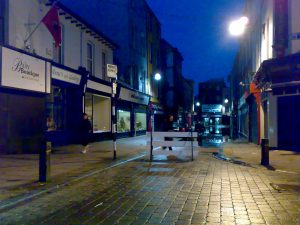About twenty eight hours after Ireland was kicked out of the World Cup, the city of Cork, the Republic of Ireland’s second largest city, was flooded by the semi-state company, Electricity Supply Board (ESB). Two weeks of heavy rain that amounted to four to six times the norm, combined with 40 to 60 millimetres of rain fall in the preceding 36 hours, and the release of water from the Inniscarra dam caused the river Lee to burst its banks and flood the city centre. €100 million is the conservative price that will need to be paid to clean up the mess.
RTE (the state broadcaster) informed the public on the evening of Thursday 19th November that water would be released from the Inniscarra dam and that the area around Inniscarra might flood. The towns in West Cork of Macroom, Bandon, Skibbereen and Ballyvourney were already impassable. I diverted through Mallow and managed to make it home, skirting several flooded roads with only a three hour delay. The entire journey I was glued to the national radio stations to get more information. There was little of any substance.
In the early hours of Friday morning 20 November, people living in the inner city awoke to the sound of rushing water entering their homes. The flood was the largest in living memory, possibly a hundred-year event. Students at University College Cork were seen swimming through the freezing flood water to reach residence halls that are still without electricity or running water. Civil Defence began evacuating older people by boat from 2AM.
The rest of Cork awoke to a flooded city. Businesses were destroyed; medical clinics were under water; a five star hotel was half underwater; and students wake-boarded on the streets. Business owners and employees rolled up their trousers and cleaned up as best as they could. A woman mucking out a hair dressing salon said, “this I can fix… eventually,” referencing the economic difficulties and feelings of helplessness.
Likewise, staff at the Mercy, a public hospital with three hundred beds, were not warned of the possibility of flooding. The emergency room had to be evacuated. Doctors, nurses, support staff, lab techs and many others took extraordinary measure to be at work on time, using any transport available. Civil Defence played chauffeur to most but others canoed, kayaked, used dinghies, cycled and walked through waist-high raging flood water.

The people of Cork pride themselves on a certain self-sufficiency. This attitude developed partly as the identity of Cork as a rebel county and partly because the people cannot rely on the government in Dublin to come to their aid in times of need. While Cork was inundated, national radio and television news provided little information. While volunteers were helping to clean out the hospital emergency room, the government was appealing to FIFA and the French government to replay the 2010 FIFA World Cup qualifier. It was only after the floods that the media started paying attention to what was happening in the second largest city in the republic.
From Friday morning, public servants, who were due to take part in a one day strike on 24 November, declared that they would not be taking part in work stoppage because of the civic emergency in Cork. Public servants in other inundated counties made similar declarations, following where Cork leads.
Gradually, information began to trickle into the national media and by 13:00 on Friday afternoon, the national media was reporting on the crisis. By 13:30 politicians were praising the efforts of the ESB in an attempt to cover up the fact that no specific warnings were made with regard to the city. The ESB released 535 cubic metres of water per second into a swollen river, claimed they sent a press release and informed the city council, and then declared that informing the public was not their department.
The City Council were effective enough at mobilising Civil Defense once the scale of the flood became clear. However, the result of either miscommunication between the ESB and the City Council or negligence or incompetence, is that 20 000 households are without water. Bottled water was sold out at Lidl and Aldi (the less expensive supermarket chains) by 11:30 on Friday 20 November. 123 000 people are still queuing for drinking water from tankers and boil notices have been issued to the rest of the population. There is temporary accommodation for those who have been displaced but the Taoiseach (prime minister) has declared that it is too early to discuss the issue of compensation.
The people of Cork have shown great resilience and community spirit in the past days. Hopefully, an official investigation will reveal the reasons why Cork was flooded and whose hand was at the wheel.

I was immediately reminded of the levees in New Orleans being blown up mid-katrina when I heard about this. If Cork ever learns this was a political stunt, there’ll be murder. Thanks for writing up on it.
Is cork ever going to be like tidy again